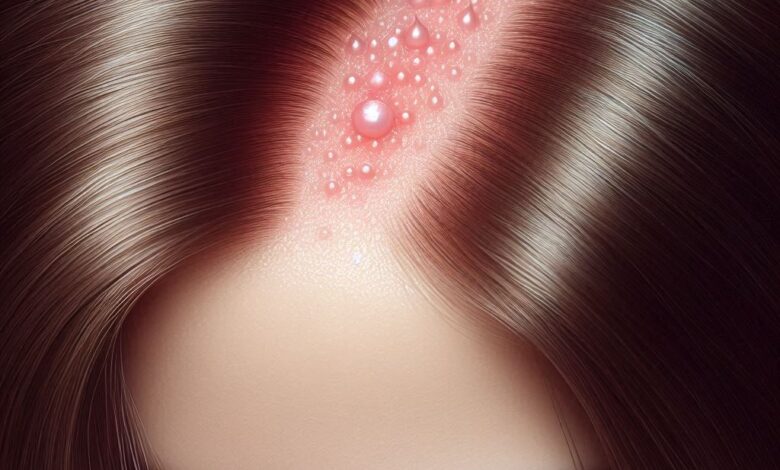The Scalp: The Fertile Ground for Healthy Hair Growth

Hair is often considered a symbol of beauty and health. But luscious locks don’t just appear; they thrive thanks to a healthy scalp – the foundation for strong, vibrant hair growth. Just like fertile soil nourishes plants, a healthy scalp provides the optimal environment for hair follicles to flourish. This article delves into the world of scalp health, exploring its role in hair growth, common scalp concerns, and effective treatments for achieving a healthy scalp and promoting beautiful hair.
The Scalp: A Complex Ecosystem
The scalp is more than just skin covering your head. It’s a complex ecosystem teeming with hair follicles, sebaceous glands, sweat glands, and a diverse microbiome. Understanding these components is crucial for maintaining scalp health:
- Hair Follicles: These tiny factories are responsible for hair growth. They house the hair papilla, a collection of blood vessels and nerves that nourishes the hair root and dictates hair growth cycles.
- Sebaceous Glands: These glands produce sebum, an oily substance that lubricates the scalp and hair shaft, keeping it hydrated and protected.
- Sweat Glands: These glands help regulate body temperature through perspiration. On the scalp, sweat mixes with sebum to create the scalp’s natural oil layer.
- Microbiome: The scalp, like other parts of the body, has its own unique microbiome – a community of microorganisms including bacteria, fungi, and yeasts. A balanced scalp microbiome is essential for overall scalp health.
The Importance of Scalp Health for Hair Growth
A healthy scalp provides the ideal environment for hair follicles to function optimally. Here’s how:
- Nutrient Delivery: A healthy scalp with good blood flow ensures a steady supply of nutrients and oxygen to the hair follicles, crucial for hair growth and health.
- Sebum Production: Balanced sebum production keeps the scalp and hair hydrated, preventing dryness and promoting hair elasticity.
- Microbiome Balance: A balanced scalp microbiome helps prevent the overgrowth of harmful bacteria that can lead to scalp irritation and hinder hair growth.
Symptoms of an Unhealthy Scalp and Hair Loss
Several signs can indicate an unhealthy scalp and potential hair loss issues:
- Dandruff and Seborrheic Dermatitis: These conditions cause white flakes (dandruff) or red, itchy patches (seborrheic dermatitis) on the scalp, often accompanied by hair loss.
- Dryness and Itchiness: A dry, itchy scalp can be uncomfortable and lead to scratching, damaging hair follicles and hindering growth.
- Inflammation: Scalp inflammation caused by factors like allergies or psoriasis can disrupt the hair growth cycle and lead to hair loss.
- Oily Scalp: Excessive sebum production can create an oily scalp, attracting dirt and promoting fungal growth that can damage hair follicles.
- Hair Loss: Hair loss can be a symptom of an underlying scalp condition or a natural part of aging. However, significant or sudden hair loss warrants consulting a dermatologist.
Common Scalp Concerns and Treatment Options
Maintaining a healthy scalp requires consistent care. Here are common scalp concerns and effective treatments:
- Dandruff and Seborrheic Dermatitis: Anti-dandruff shampoos containing ingredients like ketoconazole, coal tar, or salicylic acid can help control flaking and inflammation. Medicated shampoos prescribed by a dermatologist may be necessary for severe cases.
- Dry and Itchy Scalp: Moisturizing shampoos and conditioners formulated with ingredients like hyaluronic acid or aloe vera can help hydrate the scalp and alleviate itching. Scalp oil treatments with natural oils like jojoba or coconut oil can also provide relief.
- Oily Scalp: Clarifying shampoos with ingredients like salicylic acid or tea tree oil can help regulate sebum production. Frequent washing should be avoided, as it can strip the scalp of its natural oils and worsen the problem.
- Scalp Psoriasis: This autoimmune condition can cause itchy, red, scaly patches on the scalp. Treatment options include medicated shampoos, topical steroids, or light therapy, depending on the severity.
Natural Remedies for Scalp Health
In addition to conventional treatments, consider incorporating natural remedies into your scalp care routine:
- Apple Cider Vinegar Rinse: Diluted apple cider vinegar can help balance scalp pH and combat fungal growth.
- Scalp Massage: Regular scalp massage with gentle pressure can improve blood circulation, promote relaxation, and stimulate hair growth.
- Healthy Diet: A balanced diet rich in essential nutrients like vitamins A, C, D, E, iron, and biotin nourishes the scalp and promotes overall hair health.
- Stress Management: Chronic stress can affect hair growth. Techniques like yoga, meditation, or deep breathing can help manage stress levels and
